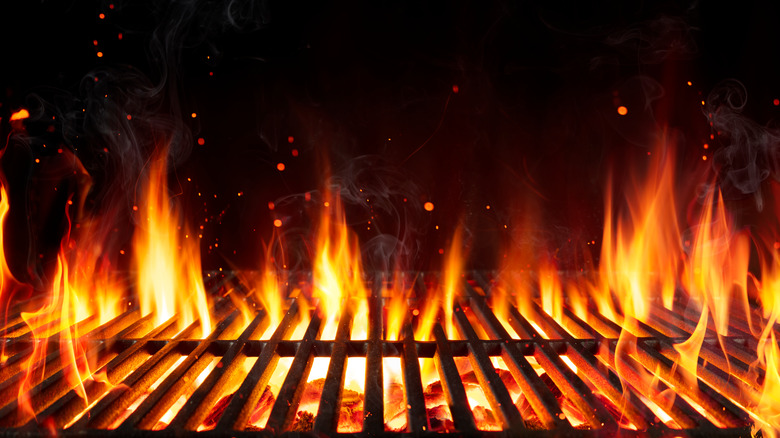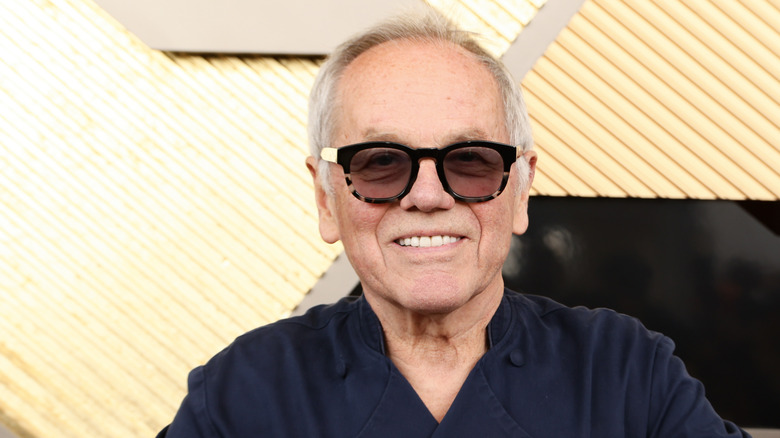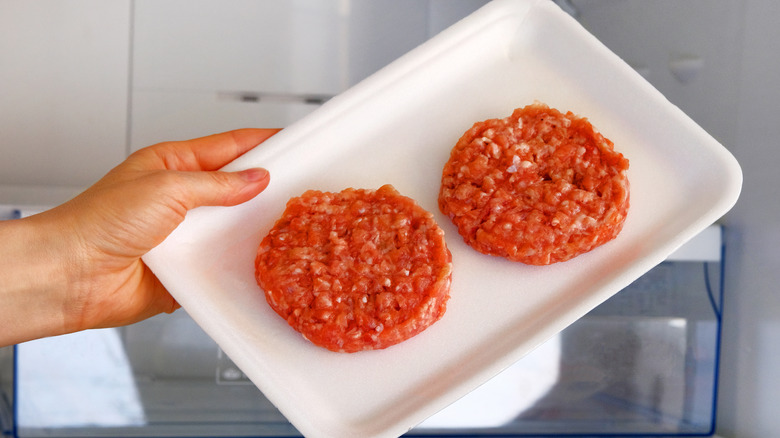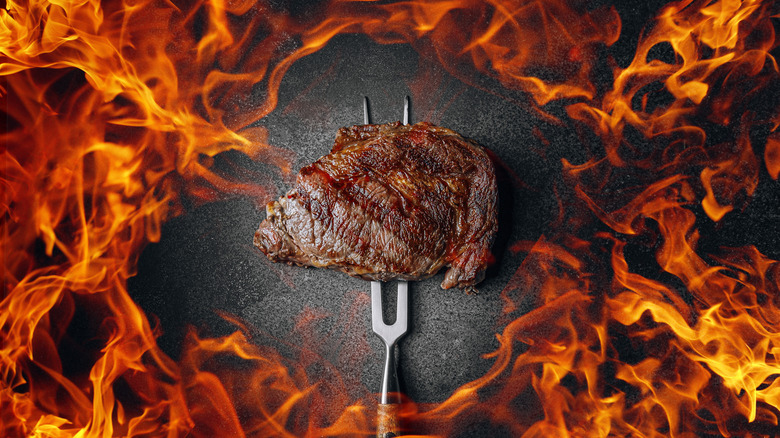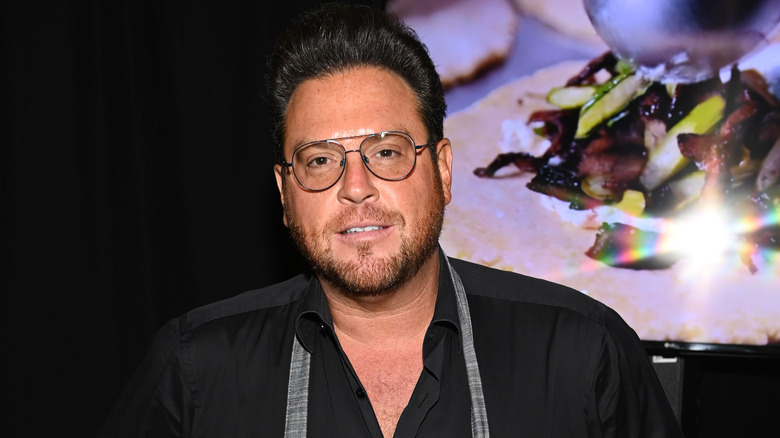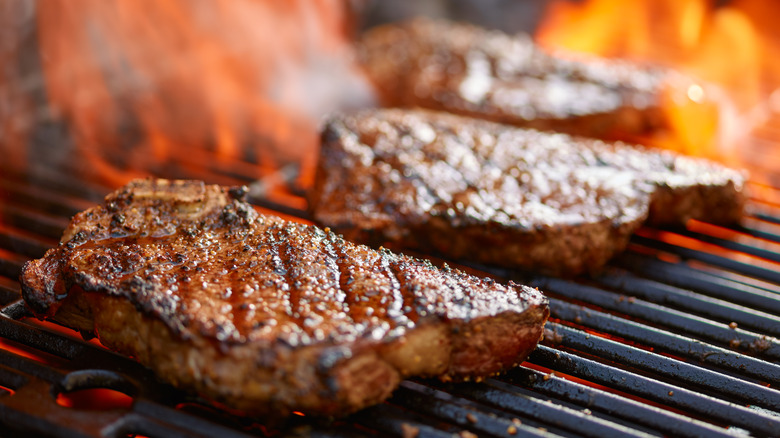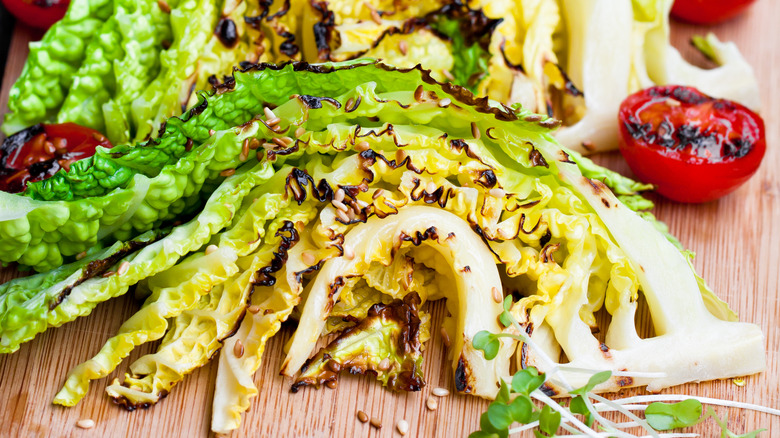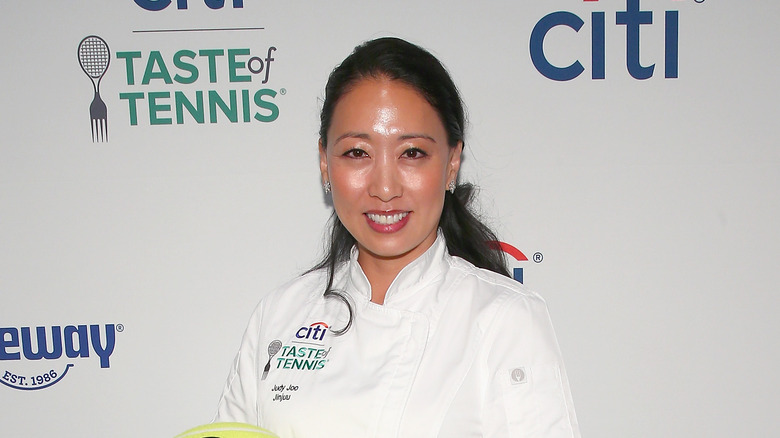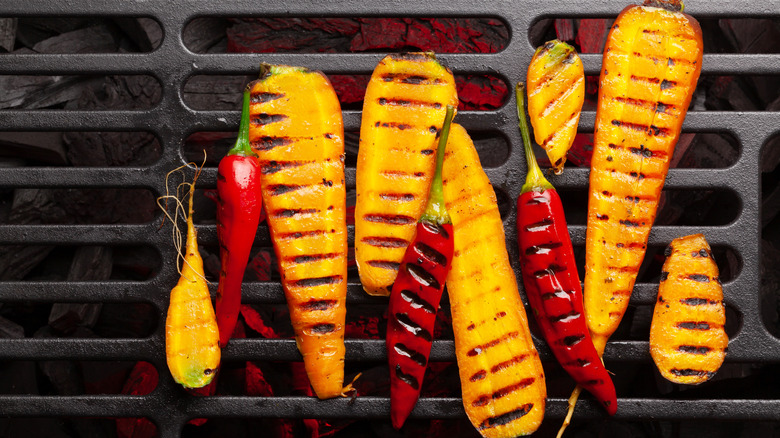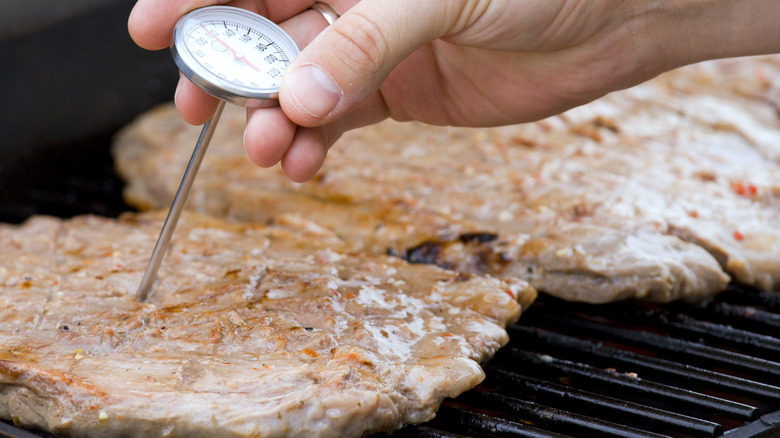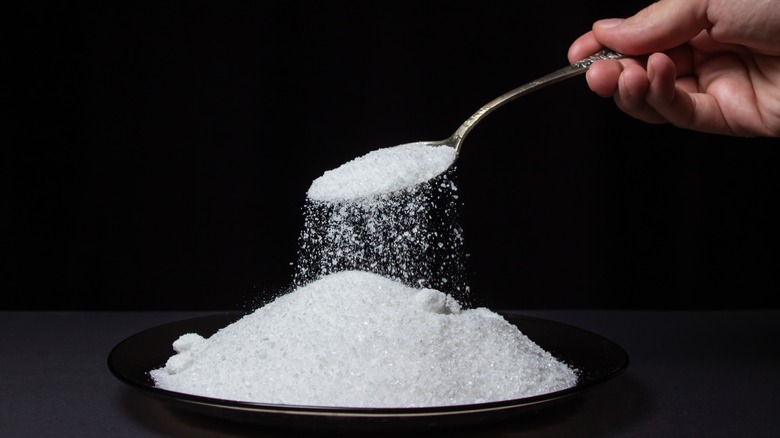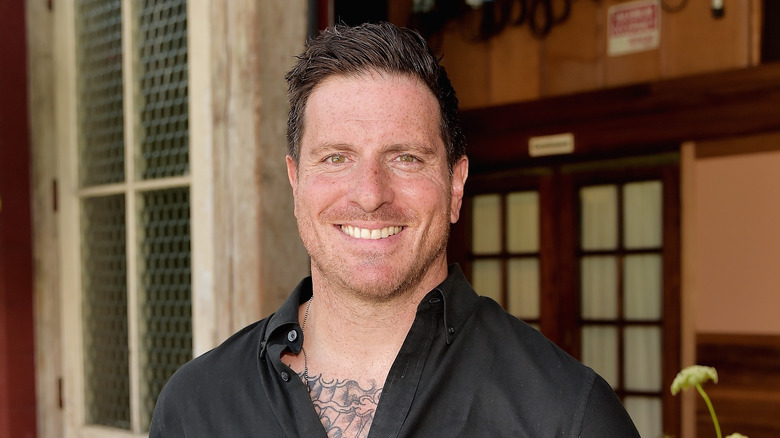14 Celebrity Chef-Approved Grilling Tips To Help You Become A Grill Master
Few things are more exciting in life than those first few days of summer. The evenings are getting longer, the whole season is stretching out ahead of you, and that fancy grill you bought a few months ago is about to get a whole lot of action. Americans' love affair with barbecues shows no signs of slowing down. In 2021, the grill and roasters market reached a size of almost $4 billion, per Statista. And for many, a grill is a serious investment, sometimes costing upwards of $5,000 each.
And with all that cash spent on grills, when you use yours, you wanna get your money's worth, right? But that relies pretty heavily on being able to cook with it properly. Contrary to popular belief, grilling isn't as simple as putting meat down on a hot surface and hoping for the best. Grilling food well is an art in itself, and if you're not doing it right, you're wasting your cooking appliance's potential. That's why we decided to enlist the experts. With these celebrity-chef-approved grilling tips, you'll learn some pro skills that'll last a lifetime, and be the envy of your neighbors at the next block party. Let's take a look.
Start with a clean grill by following Dale Talde's tips
A good grilling session begins with a well-prepared appliance. And if yours is a little dirty from the last time you used it, or has built up grime from incorrect cleaning, your food is doomed. That's why it's important to learn how to clean your grill correctly. Luckily, "All Up In My Grill" host and celeb chef Dale Talde can help.
"The easiest way to clean a gas grill [is to] just turn it on," Talde explains to Mashed. "Get that thing so hot that nothing will live on it. Once a grill is hot, it's easy to clean." As Talde states, too many people try to clean their grill while it's still cold, but this just means that any grime or dirt has had a chance to settle onto it. This is especially the case if you haven't used your grill through the cold winter months and are firing it up for the first time. By powering it up, however, you're able to loosen up some of the dirt. Once it's fired up, clean it off with a heat-resistant, long-handled grill brush, or wait for it to cool again and scrub it down with a vinegar solution. When it's sparkling clean, you're good to go with your food.
According to Wolfgang Puck, the temperature is everything
If you're in a rush to get your meat cooking, it can be tempting to throw your cuts on the grill before it's heated up properly. But, as famed chef and restauranteur Wolfgang Puck says, you need to get that grill sizzling, per Michelin. To get that telltale smokey, caramelized taste on your meat, you need to make sure your grill is super-hot. The high temperature will help to lock in the moisture of the meat, and usher in the all-important Maillard reaction. Once your meat has had a chance to brown up nicely, you can then reduce the heat to avoid it burning or getting dry, says Puck.
Temperature isn't just important for your grill, either. You also need to make sure the meat is at the right level before throwing it on. Cooking meat directly from the fridge will mean that it takes longer to heat through, which can produce an imperfectly-cooked result, Puck warns. Instead, you should take your meat out of the fridge well in advance and let it warm to room temperature. Ensure that you take it out early enough so that not just the surface of the food gets to room temperature.
Rest your burgers before grilling, like Gordon Ramsay
Of all the foods to make on the grill, burgers might be the tastiest. But they're also surprisingly tricky to cook perfectly, as anyone who's ended up with a crumbling, tough, or raw patty can attest to. The secret to delicious burgers, however, is simpler than you think, and as Gordon Ramsay reveals, is simply a matter of timing.
By preparing your burgers the night before and placing them in the fridge, you give your patties a chance to firm up and bind together properly, states Ramsay via ABC News. Then, just before you're ready to cook, give them a chance to come up to room temperature slightly. This step is important, as cooking them straight out of the fridge will mean that they stay cold inside while cooking on the outside. You don't have to give your burgers hours to get up to temperature, though — five or 10 minutes should do the trick. Finally, to avoid your burgers falling apart, make sure you're not flipping them constantly or prodding them when cooking.
Remember that direct heat is not your friend, according to Tom Colicchio
When it comes to grilling, we're often told that the more heat, the better. And while this can certainly be true in certain situations, "Top Chef" judge Tom Colicchio doesn't always love it. In fact, he advises trying to avoid direct heat wherever possible. "If you're using charcoal or wood chips, push most of them off to the side once you've heated them up to create an indirect heat zone," Colicchio says via Bravo TV. This can help that slightly charred barbecue flavor develop even more than if you're blasting your meat with heat.
Using indirect heat also allows you to avoid bursts of open flame caused by dripping grease and fat. Although it can mean that your food takes a bit more time, Colicchio states that's actually a good thing. Cooking items on a grill longer allows certain cuts of meat to remain tender. And aside from that, this approach means you can better enjoy the barbecue experience. Beer in one hand, tongs in the other, gently grilling your chops and brisket to perfection? There's nothing like it.
Scott Conant recommends seasoning well — and not just your food
Without seasoning, food is nothing. And in the case of grilling, you need to hit your food with spices and herbs to make it pop. As "Chopped" judge and celebrity chef Scott Conant states, one of the biggest grilling mistakes people make is not seasoning their grill before cooking.
Throwing herbs and seasoning vegetables onto the grill alongside your food helps to amp up the flavor, and delivers different layers of taste. If you're worried about losing herb sprigs to the open fire below the grill, try tying together a big bunch of them to minimize the chance they fall through. Remember, though, that seasoning your grill shouldn't be at the expense of seasoning your food directly, too. If you're buying herbs for the barbecue, make sure you save a certain amount to marinade your food, alongside salt, pepper, and oil. This will help taste permeate your chosen grill items, and keep everything in the same flavor world. As a bonus, any seasonings you cook on the grill, like garlic or onions, can then be eaten alongside your meats or vegetables.
Grill your steaks like Charlie Palmer
Few foods hit the spot like a big, juicy steak. But as anyone who's been disappointed when ordering "medium-rare" and getting "well-done" knows, nailing it is harder than it looks. That's why it helps to listen to the experts. And who better than celebrity chef and recipient of over 20 Michelin stars, Charlie Palmer, to guide you?
According to Palmer, it all starts with when you take steaks out of the fridge, per Esquire. You might think that they need to rest for ages before cooking. But in reality, they can go on the grill pretty much straight away. This allows them to stay rare on the inside while getting a beautiful sear on the outside. Seasoning your steak well, and basting it with oil before cooking, gives it both great flavor and stops it from sticking or burning.
Then, make sure you're hitting it with some high heat. This will allow your steak to caramelize properly on the outside. Watch it carefully for burning, though. You don't want your steak to blacken too much and become inedible. Finally, when you take it off the grill, give it some time to rest, so the juices absorb back into the center.
When grilling fish, use Bobby Flay's preparation advice
Grilling fish gives it a taste that you just can't achieve with other cooking methods. But with its tender, flaky construction, just one misstep can leave it burnt, dry, or falling apart on the hot surface. It's for this reason that expert advice is very welcome — and who better to ask about how to perfect your grilled fish than celebrity chef Bobby Flay?
Grilling fish Bobby Flay-style starts by using ample oil on a clean grill surface to help prevent your fish from sticking and becoming impossible to pry off. You'll also want to heat your grill to a pretty high temperature. If you keep it hot enough, your fish will sear properly, and this will, surprisingly, stop it from sticking.
The final tip for Flay-esque fish is arguably the most important. Once you slap your fish down onto the hot barbecue, you need to keep your hands off it. If you try and move your fish and find that it's sticking to the grill top, it's because it's not ready to be moved. Give your fillets a few minutes, and then see if they come away from the grill effectively. If they don't, gently try them periodically, until they unstick with ease.
Bored of regular cabbage? Grill it like Michael Symon
Cabbage might have the most unfair reputation of all of the vegetables out there. But for a cruciferous veggie that's frequently seen as drab and boring, it can be a thing of beauty when done correctly. And if you want to try cabbage that's pretty special, follow Michael Symon's advice and throw it on the grill. "A whole head of cabbage cut into quarters and [charred] on the grill is fantastic," Symon states in an exclusive interview with Tasting Table. While some greens can have trouble with the high heat a grill can provide, cabbage is robust enough to char without falling apart.
Grilled cabbage is a winner in a salad, as an appetizer, or as a side to your meats. And you don't have to stop there. Any hardy vegetables fare well on outside grill tops and can transform when they're barbecued. Symon recommends grilling beets and celery root, and fennel, onion, and parsnips could also make a great accompaniment to your other food, or a meal in themselves. Say goodbye to boring boiled vegetables, and slap them on your grill top.
Double up on skewers, says Judy Joo
Who doesn't love a pile of food crammed onto a skewer and grilled to perfection? Whether you're enjoying lamb kebabs or zucchini lollipops, food just tastes better when it's eaten from a stick. But skewering can be a surprisingly difficult preparation style to master. Either your food is sticking or your chosen items are warping the moment you put them on the grill, causing uneven cooking.
Luckily, chef and "Korean Food Made Simple" host Judy Joo has the solution. Instead of using one skewer, use two, she says via the Independent. By double-skewering your food, you keep it in place and stop it from twisting when it hits the hot grill. This will then mean that all of your food cooks at the same pace. And to stop things from sticking to the skewer, take a little oil and rub it along the length of the wood before putting the food on. If you want to prevent your wooden skewers from burning, soak them in some water for around half an hour before using them. This will give the water ample time to permeate the wood, and stop the skewers from catching fire when in contact with the high heat.
According to Alex Guarnaschelli, grilling carrots takes one key step
We've got a lot of love for the carrot. For such a humble, everyday vegetable, they're infinitely versatile, as home in a cake as they are in bolognese. But to unleash the carrot's true star power, you should get them on your grill. Barbecuing carrots gives them an unparalleled charred texture, which complements their natural sweetness and creates a flavor sensation.
But, given that carrots are much harder than other vegetables, grilling them can be insufficient for cooking them through, leaving them crunchy and dry. So, before grilling carrots, read Alex Guarnaschelli's advice. According to the Food Network superstar, carrots benefit immensely from a quick braise before they hit the heat. By simmering them just enough to make them tender, your carrots will be sufficiently soft inside, while also getting that much-desired smokey texture and taste. And crucially, braising carrots can amp up their flavor content, making them even more delicious before grilling. Try using a little bit of vegetable or chicken stock, with a knob of butter, some garlic, onions, and herbs. Your guests will be fighting over the remaining carrots in the dish.
You need one important piece of equipment, says Donatella Arpaia
A perfectly-grilled piece of meat can be a life-changing experience. But get it wrong, and you not only risk disappointing people but potentially passing on a foodborne illness too. Unfortunately, though, it can be tricky to know whether your meat is cooked enough inside without slicing it open and releasing those all-important juices.
So, take Donatella Arpaia's advice and grab yourself an internal thermometer, per Donatella. With this tool, you can get an accurate read of your meat's doneness. This is important because grilling can be a slightly trickier cooking method to formalize, and a few minutes here and there can be the difference between rare and well-done.
Don't just stop at one thermometer, though. The main reason to own more than one meat thermometer is to make sure you have the best utensil for your specific cut. A particularly large piece of meat, for example, may not be very well-served by that pocket-sized instrument you bought, and a larger one may be needed. Meat thermometers are generally inexpensive, too, and make a great investment for your kitchen. Whichever one you're using, ensure that you're inserting it into the thickest part of your meat, for the most accurate read.
Don't forget to sear, says Jamie Bissonnette
Think of grilled food, and meat or vegetables with a deep brown, caramelized surface likely come to mind. But that surface sometimes needs a little help. While a searing hot griddle can achieve a good char on the meat, searing your burgers before throwing them on is a must, according to top chef Jamie Bissonette.
This surprising burger grilling step helps to keep your burgers juicy, and further develop a satisfying crust. But searing meat isn't as simple as just putting it in any old pan at a high temperature. For the best results, you need the right cookware. For perfect stovetop searing, grab yourself a cast-iron pan. Cast-iron cookware is designed to achieve super-hot heat and retain it for a longer amount of time than pans made from other materials. This is vital for your burgers, as the aim when searing meat is to develop the texture of the surface without cooking it too much on the inside. If you use cookware that can't achieve the same temperature, though, you'll end up just cooking it through before it even reaches the grill.
You don't need loads of salt and sugar for flavor, advises Robert Irvine
It's a common teaching that to achieve maximum taste, you need to season your food well. And that's certainly true — but when grilling, you don't necessarily need to do that with abundant amounts of salt, sugar, and fat. That can hamper the nutritional content of your food considerably. Part of the joy of grilling is to enjoy al fresco dining in glorious nature, so you want your food to feel as vibrant and nourishing as your surroundings.
Follow Robert Irvine's advice, and go for recipes that season food in more innovative ways, per Curbed Hamptons. Instead of hitting your meat or marinades with loads of salt and sugar, either through homemade or store-bought products, favor more wholesome flavor boosters. Using orange or lemon juice, fresh herbs, and other aromatics can impart zest to your food without making it less healthy. For your salads, try to avoid claggy, fat-heavy dressings, and opt for lighter, fresher items. And while fatty meat can give you a huge amount of taste, too much fat can just be cumbersome to eat. That's why Irvine advises going for leaner cuts, the flavor of which can be amped up with a good marinade.
Make perfect duck breasts on your grill every time with Seamus Mullen's method
Serving up duck just screams luxury. But as a meat that isn't served as often as chicken or beef, cooking duck can be a bit of a question mark for some. And while stovetop or oven cooking might be what you resort to, cooking duck breast on the grill is one of the best ways to do it, says famed chef Seamus Mullen (via Food Republic).
While grilling duck is a pretty rare practice, it works particularly well, as the smoke from the grill permeates the meat and fat content. Mullen states that it's best to begin by searing the skin, to achieve that all-important crisp. The duck breast should then be allowed to cook through slowly so that it doesn't dry out. It can help to cover the breast while you do this so that the heat doesn't escape. Finally, remember to rest your duck breasts before serving them. Resting cuts before you plate them up allows the juices to better incorporate with the meat again, producing a tender, flavorful result.
Static Media owns and operates The Daily Meal, Mashed, and TastingTable.
